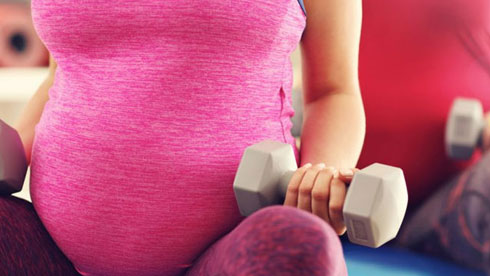 Pregnant woman should be careful about her diet as it can affect her unborn baby. Read on to find out what is unsafe to eat during pregnancy.
Pregnant woman should be careful about her diet as it can affect her unborn baby. Read on to find out what is unsafe to eat during pregnancy. Eating well balanced meal is always important; it is most when you are pregnant. Your baby needs essential nutrients, vitamins, and minerals. However, there are few foods that can cause harm to you and your unborn baby leading to impaired brain development, development delays, fetal abnormalities, low
birth-weight infants, premature deliveries, andeven miscarriages. Though you need not get scared, just keep knowledge of what is going inside you.
1. Fish and Seafood
Seafood can be a great source of omega-3 fatty acids along with protein, but few of them like swordfish, shark, king mackerel, tilefish, etc. have dangerous levels of mercury that could harm your baby’s developing nervous system. Pregnant women can safely eat up to 340 grams of mercury a week, so consider seafood like shrimps, canned light tuna, catfish, salmon, anchovies, etc.
Raw fish like sushi sashimi, raw oysters, scallops, clams, etc. and also refrigerated and smoked seafood may contain bacteria like Listeria and Salmonella that can cause food poisoning and also miscarriage.
Avoid eating fish that are from contaminated lakes and rivers as they may be exposed to high levels of polychlorinated biphenyls. You must talk to the fish-seller to know exactly where the fish is from.
2. Raw and Undercooked Poultry
Raw or undercooked eggs and meat can make you susceptible to certain parasitic diseases along with contamination with bacteria like Toxoplasmosis, Listeria and Salmonella, leading to potentially serious foodborne illness known as listeriosis or premature birth or mental retardation in the baby.
Avoid homemade Caesar dressings, homemade ice creams, or mayonnaise as they may contain raw eggs. Commercially manufactured ice creams are made with pasteurized eggs, and thus are safe for an expectant mother.
3. Unpasteurized Dairy Foods
Unpasteurized milk or cheese may contain Listeria that can pass through the placenta and infect your baby causing food poisoning and even miscarriage. Always make sure that your dairy products are pasteurized.
Avoid raw milk, soft cheese and unpasteurized and untreated juices as well. Consider having milk and juices from tetrapacks as they have been pasteurized.
4. Excessive Caffeine
Caffeine can cross the placenta and affect your baby’s heart rate and may lead to miscarriage, premature birth, low birth weight, and withdrawal symptoms in infants.
Caffeine being a diuretic, it eliminates fluids from the body, causing loss of water and calcium.
Limit your caffeine intake to just two cups a day if you cannot really take it off your diet. Reduce aerated or caffeine-based beverages like coffee, tea, and colas.
5. Alcoholic Drinks
Moderate drinking also affect your baby’s brain development, so if you consider alcohol is fine, then you are exposing yourself to a higher risk of miscarriage and stillbirth. Too much alcohol also leads to fetal alcohol syndrome, causing facial deformities, mental retardation, and heart defects in your baby.
Alcohol does reach the baby during breastfeeding also, so if you have consumed alcohol before pregnancy, stop it now, and enjoy a healthier pregnancy.
With your body undergoing so many changes, you must be alert of your surroundings in these nine months, which may be the most challenging time of your life. Everyone advises you to eat more when you are a mom-to-be. It is true that your body requirements increase during these months, but that certainly does not mean that you can eat just anything and everything. You have to keep an eye what to eat and what not to eat and keep yourself and your baby in shape and good health.
Is it safe to eat papaya during pregnancy? Which foods can cause miscarriage during pregnancy? Is it safe to eat fish and seafood during pregnancy? Discuss here.











 Pregnant woman should be careful about her diet as it can affect her unborn baby. Read on to find out what is unsafe to eat during pregnancy. Eating well balanced meal is always important; it is most when you are pregnant. Your baby needs essential nutrients, vitamins, and minerals. However, there are few foods that can cause harm to you and your unborn baby leading to impaired brain development, development delays, fetal abnormalities, low
Pregnant woman should be careful about her diet as it can affect her unborn baby. Read on to find out what is unsafe to eat during pregnancy. Eating well balanced meal is always important; it is most when you are pregnant. Your baby needs essential nutrients, vitamins, and minerals. However, there are few foods that can cause harm to you and your unborn baby leading to impaired brain development, development delays, fetal abnormalities, low 

















